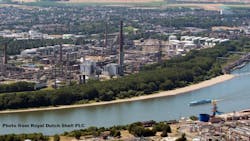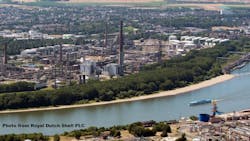Shell’s Rheinland refinery due hydrogen plant
Royal Dutch Shell PLC subsidiary Shell Deutschland Oil GMBH is building what will become the world’s largest hydrogen electrolysis plant at the 140,000-b/d refinery at Wesseling, Germany, which together with the former Godorf refinery near Cologne-Godorf, form its 325,000-b/d integrated Rheinland refinery, Germany’s largest.
With a peak capacity of 10 Mw, the proposed plant will use electricity rather than natural gas to produce hydrogen to be used for processing and upgrading of products at the refinery’s Wesseling site as well as testing the technology and exploring application in other sectors, Shell said.
With Shell and its European partner consortium of ITM Power PLC, SINTEF Industry, thinkstep AG, and Element Energy already having secured €10 million in funding from the European Union’s Fuel Cell Hydrogen Joint Undertaking for the project, Shell said it will now begin detailed technical planning and approvals for the new plant.
Total project investment, including integration into the refinery, will be about €20 million.
Pending final approval, the plant—to be named Refhyne—is scheduled to be in operation in 2020 and will be the first industrial-scale test of the polymer electrolyte membrane (PEM) electrolysis technology process, Shell said.
Unit overview
Currently, the Rheinland refinery requires about 180,000 tonnes/year of hydrogen that is produced by steam reforming from natural gas.
The new unit will be able to produce an additional 1,300 tpy of hydrogen, which can be fully integrated into refinery processes such as desulfurization of conventional fuels.
“A unit of this kind brings a flexibility that can help the stability of the power grid, thereby facilitating more use of renewable electricity”, said Lori Ryerkerk, executive vice-president of Shell Manufacturing.
“In addition, if powered by renewable electricity, the green hydrogen will help reduce the carbon intensity of the site—a key goal for us,” Ryerkerk added.
Contact Robert Brelsford at [email protected].

